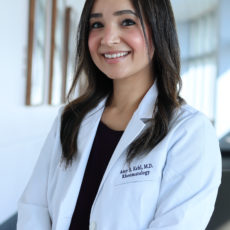Rheumatoid Arthritis

Overview
What is Rheumatoid Arthritis?
Rheumatoid Arthritis (RA) is the most common inflammatory arthritis. More than 1.3 million Americans are affected by RA, and approximately 75% of RA patients are women. It has been shown that between 1 – 3% of women may develop rheumatoid arthritis in their lifetime. While RA most often begins between the ages of 30 and 50, it can start at any age.
Symptoms
Symptoms of Rheumatoid Arthritis
The most typical symptoms of RA are joint pain and stiffness, swelling and decreased movement. Joints in the hands and feet are most commonly affected, although RA can also impact larger joints thoughout the body. Other less common signs and symptoms of RA include:
Diagnosis
Diagnosis of Rheumatoid Arthritis
Rheumatic diseases are complex in nature and often difficult to diagnose. A rheumatologist is a specialist with the skill and knowledge to reach a correct diagnosis of RA and to recommend a treatment plan. During a patient’s initial visit, the rheumatologists will gather a complete medical history and perform a physical examination to look for systemic signs and symptoms of inflammation. While there is no one test for RA, a combination of diagnostics can definitively diagnose it. Blood tests are used to determine if antibodies are present and to look for high levels of inflammation. Ultrasound, MRI or x-rays can also confirm and determine the severity of RA. A physical examination of the joints may also be used to confirm inflammation in RA.
Treatments
Treatments for Rheumatoid Arthritis
There is no cure for RA, but the good news is that the right medications can provide excellent relief from pain and the ability to perform near-normal levels of daily activities. When the symptoms are completely controlled, RA is considered to be in “remission.” Starting medication as soon as possible helps prevent joints from having lasting or permanent damage.
People in the early stage of the disease will usually be started on disease-modifying antirheumatic drugs (DMARDs). They not only relieve symptoms but also can slow the progression of joint damage. People with more advanced RA may need medications called biologic response modifiers or “biologic agents.” They help block immune system chemical signals that lead to inflammation and joint/tissue damage.
Patient education and regular surveillance are also key to managing RA. Regular visits with a rheumatologist help track the course of RA and check for any side effects of medications. Patients may also benefit from the services of physical and occupational therapists.
Clinical Trials
Rheumatoid Arthritis Clinical Trials
The rheumatologists at Saint John’s Physician Partners have been integrally involved in the development of medications that treat inflammatory arthritis conditions for decades. They were involved in the clinical trials that led to the approval at the Food and Drug Administration (FDA) for medications that treat rheumatoid arthritis (RA), psoriatic arthritis (PsA), ankylosing spondylitis (SpA), osteoarthritis, and other bone and skin conditions like osteoporosis and psoriasis advanced therapies, some of which are biologic treatments.

Specialists
Rheumatoid Arthritis Specialists
Orrin Troum, M.D. and Amro Elbalkhi, M.D. provide consultation, diagnosis, and treatment for rheumatic diseases including inflammatory arthritis (rheumatoid arthritis, psoriatic arthritis, ankylosing spondylitis), scleroderma, myositis, gout, lupus, osteoarthritis, and osteoporosis. The Medical Doctors of Saint Johns strive to provide world class care and a personalized treatment plan for all patients and their families.


